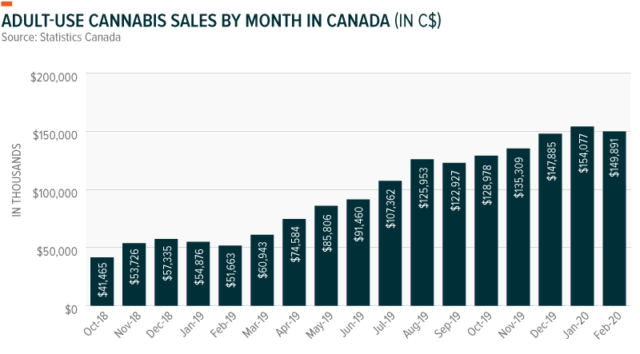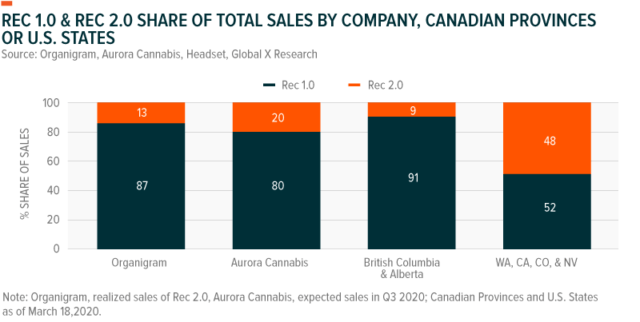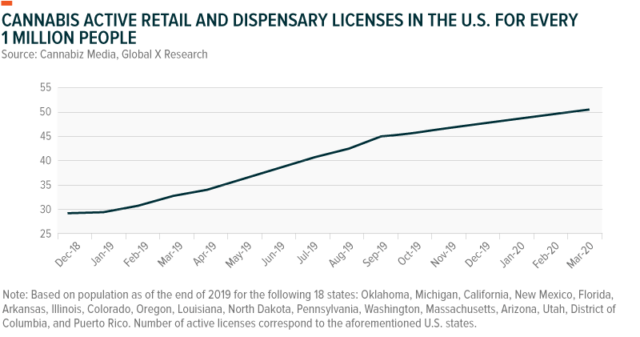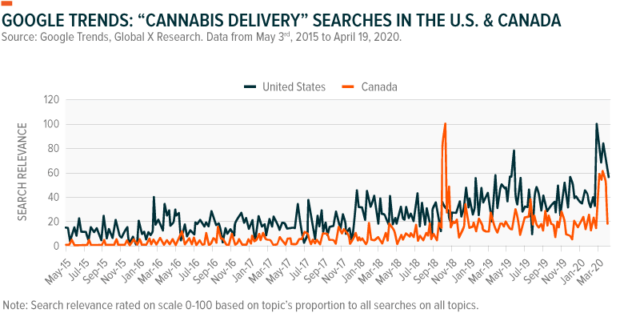SPONSOR: Hollister Biosciences Inc. (HOLL:CSE) A vertically integrated cannabis company with products in 220 California dispensaries and joint ventures, licensing agreement & partnerships with global brands. The company recently closed $20 MILLION deal with Venom Extracts adding $CDN 16.4 million in revenue and $CDN 2.48 million in EBITDA. Learn More

How The Cannabis Industry Is Coping In 2020
- Canada and most U.S. states with legalized cannabis industries declared dispensaries as essential services, allowing sales to continue throughout the COVID-19 crisis, enabling robust demand to be met
- Even with strong sales momentum, cannabis stocks broadly suffered during the quarter amid heightened market volatility
- Early-stage cannabis companies rely heavily on external capital to fuel their growth ambitions, but investors are stepping back from financing riskier industries in the current environment
- Despite these near-term challenges, we remain optimistic on the longer-term prospects for cannabis as its acceptance grows
Amid widespread COVID-19-related retail store closures, many cannabis dispensaries received “essential business” designations. This allowed cannabis consumers to stock up on medicinal and recreational cannabis, fueling strong sales figures despite a tumultuous Q1 2020. Yet, even with strong sales momentum, cannabis stocks broadly suffered during the quarter amid heightened market volatility. Early-stage cannabis companies rely heavily on external capital to fuel their growth ambitions, but investors are stepping back from financing riskier industries in the current environment. Some cannabis companies are now running low on cash, forcing them to sell stakes at undesirable valuations or scale back operations or staffing.
Despite these near-term challenges, we remain optimistic on the longer-term prospects for cannabis as its acceptance grows. New store openings and the sale of edibles are helping to fuel greater legal consumption. In addition, COVID-19’s economic impact is broadly hurting tax revenues at the local, state, and federal level, potentially providing greater impetus to legalize and tax cannabis. With only about 10% of cannabis sales occurring through legal channels, we believe there is substantial opportunity for continued growth across regulated channels.
Is Cannabis A Consumer Staple?
The COVID-19 crisis is plunging the global economy into recession, yet its impact will not be felt equally across industries. During recessions, consumers may forgo discretionary items like jewelry or electronics, but staples such as essential food and beverages tend to see robust sales. Historically, alcohol and tobacco exhibit staples-like characteristics, demonstrating strong sales despite economic weakness. During the global financial crisis, for example, alcohol consumption increased 7.2% in 2008-09 from 2006-07 levels, while total sales in the consumer discretionary sector fell by -9.35% over that time frame.1,2
Legalized cannabis did not exist during the Great Recession, but recent figures suggest cannabis sales share similar characteristics with alcohol and tobacco. Canada and most U.S. states with legalized cannabis industries declared dispensaries as essential services, allowing sales to continue throughout the COVID-19 crisis, enabling robust demand to be met.
- Online cannabis purchases in Ontario have surged from 5,000 orders in mid-March to 9,000 orders by mid-April.3
- Oregon’s cannabis sales increased 37% year over year in March, its highest single-month increase.4
- Between March 16th and March 22nd, year-over-year sales of recreational cannabis across key US markets, including California, Colorado, Oregon and Alaska, were up 50%.5
- One of Nevada’s largest cannabis delivery businesses reported a 400% increase in cannabis retail deliveries since March 20th.6
While lockdown may have accelerated cannabis demand, cannabis sales were already on an accelerating path. January and February sales numbers in Canada increased 181% year-over-year to C$154 million and 190% to C$150 million.7 Estimates from Cannabis Benchmarks for March sales show a spike to C$216 million, more than three times March 2019’s sales of C$59 million.8

The shift towards greater cannabis acceptance has spurred much of this growth. Cannabis consumers among the legal adult population in Canada grew to 63% at the end of 2019 from 54% in 2018.9
Canada’s new recreational cannabis market, dubbed Rec 2.0, is also fueling growth. Rec 2.0 officially launched at the end of 2019, almost a year after legalization in Canada. Before Rec 2.0, only dried flower and oil were products sold, but now the sale of cannabis beverages, edibles and vapes, among other forms, is permitted. Derivative formats like these account for almost half of sales in mature and developed markets such as Colorado, showing how Rec 2.0 could play a major role in accelerating cannabis sales in Canada. Aurora Cannabis (ACB), for example, recently mentioned that approximately 20% of total sales could come from Rec 2.0 products.10 OrganiGram Holdings (OGI) also reported new Rec 2.0 products to account for 13% of total revenue in its most recent quarter.11

New Store Openings Grow Legal Cannabis’s Market Share
Curbing illicit cannabis sales is on the agenda for many governments around the world. Globally, legal cannabis sales reached $15 billion at the end of 2019, which is less than 10% of the estimated total market of $160 billion.12 Such low penetration both demonstrates the growth opportunity ahead as well as highlights some of the challenges for the legal market. In Canada, for instance, limited dispensary licenses plays a major factor, as recreational cannabis sales per capita are highly correlated to the number of stores.
In Q1 2020, Canada opened 191 new stores, bringing its total to 806.13 Ontario, Canada’s most populous province, now has 52 stores, versus just 27 at the end of 2019. But the few dozen stores represent just four per 1 million people. For comparison, Colorado has 180 stores for every 1 million people.14 The store comparison between the two countries is notable, as further licenses should help meet consumer demand and promote greater legal sales.
Within the U.S., active dispensary licenses are up 5.5% year-to-date, with 385 new stores opening around the country.15 Yet, given that the US has nine times more dispensary licenses than Canada, more stores is a less critical factor than wider legalization across populous states or at the broader federal level.

Cannabis Industry Leveraging E-commerce To Further Grow Sales
Oftentimes, crises breed both new problems and new solutions. During this social distancing era, Colorado legalized online sales of recreational cannabis, fulfilling a longstanding request from cannabis companies.16 Cannabis consumers can now order, pay online and pick up at-store. A few other states – Massachusetts, Illinois, Michigan and Oregon – already allow cannabis e-commerce.
In Canada, the Alcohol and Gaming Commission of Ontario (AGCO) authorized cannabis retail stores to offer e-commerce solutions, starting April 7th.17 E-commerce authorization resulted from an emergency order by the Government of Ontario to deter illegal cannabis sales amid physical distance mandates. For now, the measure is temporary, but it includes the possibility of extension.

Financing Cannabis’s Growth
Early-stage industries tend to rely on the capital markets to fund growth. The phenomenon describes a healthy dynamic between those with capital to invest and those seeking capital for growth. The cannabis industry is particularly dependent on capital, as growing, harvesting, packaging and distribution require property, equipment and employees. With high growth expectations, cannabis companies tend to plow their freshly raised capital into various parts of the ecosystem, leaving little cash available to weather a storm. The constant need for new financing can expose weaker companies that may need to raise capital at undesirable terms, or worse, cannot raise additional capital at all.
HEXO Corp. (HEXO), for example, a leading cannabis grower in Canada, recently closed a C$46 million public offering but was forced to sell its equity 20% below its last traded price.18 Other larger players have followed suit, like Tilray (TLRY), which raised C$90 also at a 20% discount.19
There are companies, however, with strong cash positions that may be able to weather this challenging financing environment better than others. Canopy Growth Corp. (CGC) and Cronos Group (CRON) both have over $1 billion in cash & equivalents on their balance sheets. GW Pharmaceuticals (GWPH) holds over $500 million in cash & equivalents. Balance sheet strength allows these companies to potentially wait longer before needing to raise additional outside capital.
COVID-19 Could Expedite Cannabis Legalization
In our article “Themes for Defensive Positioning,” we highlighted that economic downturns can accelerate efforts to find new sources of economic stimulus and tax revenue. Legalizing (and taxing) recreational cannabis is one such avenue states could pursue given its track record of generating economic growth and taxes. Estimates hold that nationwide legalization in the U.S. could generate $132 billion in aggregate tax revenue and more than a million new jobs across the country by 2025.20 Such growth comes not from an unproven, speculative market, but from the conversion of a largely illicit market to a legal, regulated one. Such taxes and economic growth could be particularly welcome given stalling economic growth and swelling debt caused by COVID-19.
This year, several states could legalize recreational use. Virginia recently decriminalized cannabis, joining 27 other states that have taken such actions.21 The bill doesn’t legalize cannabis sales yet, but Virginia’s Governor is also clearing the path for easier access for medicinal uses.22 In New Jersey, lawmakers voted to add legalization to November’s ballot. Should the bill pass, it could add additional pressure to neighboring New York and Connecticut.
Illinois, where legalized cannabis went into effect in January, is the most recent model other states could follow. Illinois has the second-highest tax regime on cannabis sales in the country, where taxes vary from 10% to 25%.23 In Q1, Illinois cannabis stores sold $110 million, generating at least $11 million in tax revenues. Another benchmark is Colorado, which legalized cannabis in 2014. In Q1 2020, Colorado generated $79 million in tax revenue from cannabis-related sales.24 In 2019 alone, the state collected over $300 million in tax revenue, which was earmarked for cannabis regulation, research and schools.25
With a global recession looming, the economic benefits of legalized cannabis could be too enticing for states, provinces and countries to ignore.
Conclusion
The recent increase in cannabis sales in the U.S. and Canada since COVID-19 reflects the non-cyclical nature of cannabis sales. While some cannabis companies may struggle from lack of access to capital during this volatile period, the stronger ones could continue to see substantial growth as they meet robust consumer demand. Trends in new dispensary openings, a shift to e-commerce, and the introduction of new consumable forms of cannabis should further fuel growth across North America. Longer term, the potential for further legalization efforts amid the COVID-19 crisis should provide a tailwind to the industry.
Related ETFs
POTX: The Global X Cannabis ETF seeks to invest in companies across the cannabis industry. This includes companies involved in the legal production, growth and distribution of cannabis and industrial hemp, as well as those involved in providing financial services to the cannabis industry, pharmaceutical applications of cannabis, cannabidiol (i.e., CBD), or other related uses including but not limited to extracts, derivatives or synthetic versions.
Please click on the fund name for current holdings.
Footnotes
1. Jacob Bor, et al. “Alcohol Use During the Great Recession of 2008-2009,” January 29, 2013.
2. U.S. Census Bureau. Discretionary sales including retail sales of Motor Vehicles & Parts, Furnitures, Electronics & Appliances, Clothing, Sporting Goods, General Merchandise, and Miscellaneous Stores. Accessed on April 2020.
3. Cannabis Benchmarks, “Canada Cannabis Spot Index (CCSI)”, April 17, 2020.
4. Willamette Week, “Oregon Cannabis Sales in March Were the Highest Ever for a Single Month,” April 6, 2020.
5. New York Post, “Cannabis sales hit new highs in US and Canada,” March 24, 2020
6. Reno Gazette Journal, “Nevada marijuana deliveries are skyrocketing. Is this the new normal for the pot industry?,” March 30, 2020.
7. Statistics Canada, “Cannabis Stores Sales,” Accessed on April 2020.
8. Cannabis Benchmarks, (n3).
9. BDS Analytics, “How Will “Cannabis 2.0″ Affect the Legal Canadian Market?,” February 18, 2020.
10. Aurora Cannabis, “Q2 2020 Earnings Call Transcript,” February 13, 2020.
11. Organigram, “Organigram Reports Second Quarter Fiscal 2020 Results,” April 14, 2020.
12. Global X ETFs, “Introducing the Global X Cannabis ETF (POTX),” September 19, 2019.
13. Cannabis Benchmarks, (n3).
14. Note: According to CannabizMedia, Colorado has 1,038 active licenses. Per the U.S. Census Bureau, Colorado’s population is 5.759 million people.
15. CannabizMedia, “Cannacurio: Dispensary & Retailer Leaderboard (Q1 2020),” April 13, 2020.
16. The Colorado Sun, “Coronavirus fuels marijuana industry’s push for online sales, delivery in Colorado,” April 13, 2020.
17. Alcohol and Gaming Commission of Ontario, “Ontario Allows Cannabis Delivery and Curbside Pick-up from Authorized Retail Stores During COVID-19,” April 7, 2020.
18. Hexo Corp, “HEXO Corp. Closes $46 Million Underwritten Public Offering,” April 13, 2020.
19. Tilray, “Tilray, Inc. Announces Pricing of its $90.4 Million Registered Offering,” March 13, 2020.
20. The Washington Post, “Study: Legal marijuana could generate more than $132 billion in federal tax revenue and 1 million jobs,” January 10, 2018.
21. Leafly, “Virginia just decriminalized marijuana. Here’s what that means,” April 13, 2020.
22. Marijuana Moment, “Virginia Governor Urges Medical Marijuana Expansion As Amendment To Recently Approved Bill,” April 15, 2020.
23. Illinois Policy, “What you need to know about marijuana legalization in Illinois?,” January 1, 2020.
24. Colorado Department of Revenue, “Marijuana Tax Data,” April 2020.
25. Ibis.
Investing involves risk, including the possible loss of principal. The investable universe of companies in which POTX may invest may be limited. The Fund invests in securities of companies engaged in Healthcare and Pharmaceutical sectors. These sectors can be affected by government regulations, expiring patents, rapid product obsolescence, and intense industry competition. International investments may involve risk of capital loss from unfavorable fluctuation in currency values, from differences in generally accepted accounting principles or from social, economic or political instability in other nations. POTX is non-diversified.
POTX’s investments are concentrated in the cannabis industry, and the Fund may be susceptible to loss due to adverse occurrences affecting this industry. The cannabis industry is a very young, fast evolving industry with increased exposure to the risks associated with changes in applicable laws (including increased regulation, other rule changes, and related federal and state enforcement activities), as well as market developments, which may cause businesses to contract or close suddenly and negatively impact the value of securities held by the Fund. Cannabis Companies are subject to various laws and regulations that may differ at the state/local, federal and international level. These laws and regulations may significantly affect a Cannabis Company’s ability to secure financing and traditional banking services, impact the market for cannabis business sales and services, and set limitations on cannabis use, production, transportation, export and storage. The possession, use and importation of marijuana remains illegal under U.S. federal law. Federal law criminalizing the use of marijuana remains enforceable notwithstanding state laws that legalize its use for medicinal and recreational purposes. This conflict creates volatility and risk for all Cannabis Companies, and any stepped-up enforcement of marijuana laws by the federal government could adversely affect the value of the Fund’s investments. Given the uncertain nature of the regulation of the cannabis industry in the United States, the Fund’s investment in certain entities could, under unique circumstances, raise issues under one or more of those laws, and any investigation or prosecution related to those investments could result in expense and losses to the Fund.
Shares of ETFs are bought and sold at market price (not NAV) and are not individually redeemed from the Fund. Brokerage commissions will reduce returns. Global X NAVs are calculated using prices as of 4:00 PM Eastern Time. The closing price is the Mid-Point between the Bid and Ask price as of the close of exchange. Closing price returns do not represent the returns you would receive if you traded shares at other times. Indices are unmanaged and do not include the effect of fees, expenses or sales charges. One cannot invest directly in an index.
Since the Fund’s shares did not trade in the secondary market until several days after the Fund’s inception, for the period from inception to the first day of secondary market trading in Shares, the NAV of the Fund is used to calculate market returns.
Global X Management Company LLC serves as an advisor to Global X Funds. The Funds are distributed by SEI Investments Distribution Co. (SIDCO), which is not affiliated with Global X Management Company LLC or Mirae Asset Global Investments. Global X Funds are not sponsored, endorsed, issued, sold or promoted by Solactive AG, nor does Solactive AG make any representations regarding the advisability of investing in the Global X Funds. Neither SIDCO, Global X nor Mirae Asset Global Investments are affiliated with Solactive AG.
Source: https://seekingalpha.com/article/4343907-how-cannabis-industry-is-coping-in-2020